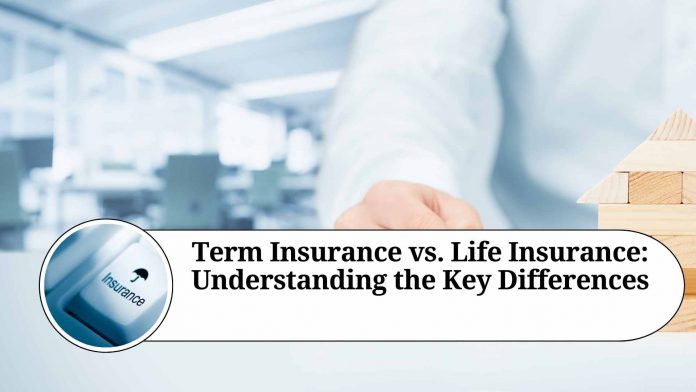Introduction:
When it comes to securing our financial future and protecting our loved ones, insurance plays a crucial role. However, navigating the vast array of insurance options can be overwhelming. Two common types of life insurance policies are term insurance and life insurance. While both serve the purpose of providing financial protection, they differ significantly in terms of coverage, duration, and cost. In this blog, we will explore the key differences between term insurance and life insurance to help you make an informed decision.
Coverage Duration:
One of the primary distinctions between term insurance and life insurance lies in the coverage duration.
- Term Insurance: As the name suggests, term insurance offers coverage for a specific term or duration, such as 10, 20, or 30 years. If the policyholder passes away during the term, the beneficiaries receive the death benefit. However, once the term ends, the policy expires, and there is no payout or cash value.
- Life Insurance: Life insurance, also known as permanent or whole life insurance, provides coverage for the entire lifetime of the insured individual. This means that as long as the premiums are paid, the policy remains active, and the beneficiaries will receive the death benefit when the insured person passes away. Additionally, life insurance policies often accumulate cash value over time, which can be borrowed against or withdrawn.
Death Benefit:
Both term insurance and life insurance policies offer death benefits, but the amount and payout structure differ.
- Term Insurance: Term insurance policies typically provide a higher death benefit for a lower premium compared to life insurance. The death benefit is paid out if the insured person passes away during the policy term. However, if the term expires and the policy is not renewed or converted, there is no payout.
- Life Insurance: Life insurance policies usually have a lower death benefit in relation to the premiums paid when compared to term insurance. However, the death benefit is guaranteed as long as the premiums are maintained. In addition, life insurance policies may also include a cash value component, which accumulates over time and can be used for various purposes while the policyholder is alive.
Premiums and Cost:
The cost of insurance premiums is a crucial factor to consider when choosing between term insurance and life insurance.
- Term Insurance: Term insurance policies generally have lower premiums, especially for younger and healthier individuals. The premiums remain fixed throughout the term but may increase significantly when the policy is renewed. However, since term insurance only provides coverage for a specified term, there is no cash value or investment component, resulting in lower overall costs.
- Life Insurance: Life insurance premiums are typically higher than term insurance premiums. This is because life insurance policies provide lifelong coverage and may accumulate cash value over time. The premiums are often level and do not increase as the insured person ages. Although the cost may be higher, life insurance policies offer additional benefits such as cash value growth and the option to borrow against the policy.
Conclusion:
Choosing the right insurance policy depends on individual circumstances, financial goals, and risk tolerance. Term insurance is ideal for those seeking affordable coverage for a specific term, offering high death benefits at a lower cost. On the other hand, life insurance provides lifelong protection, cash value accumulation, and guarantees a death benefit payout. Understanding the differences between term insurance and life insurance will help you make an informed decision based on your unique needs and priorities.
Read more useful content:
Frequently Asked Questions (FAQs)
Q.What is the main difference between term insurance and life insurance?
Term insurance provides coverage for a specific term or duration, while life insurance offers lifelong coverage.
Q.Which insurance type is more affordable, term insurance, or life insurance?
Term insurance generally has lower premiums compared to life insurance, especially for younger and healthier individuals.
Q.Do term insurance policies have a cash value component?
No, term insurance policies do not have a cash value component. They only provide a death benefit if the insured person passes away during the policy term.
Q.Can I renew a term insurance policy once it expires?
Some term insurance policies offer the option to renew or convert to a permanent policy, but it often comes with an increase in premiums.
Q.Does life insurance accumulate cash value over time?
Yes, life insurance policies often accumulate cash value over time, which can be borrowed against or withdrawn.
Q.Are the premiums for life insurance policies fixed?
Yes, the premiums for life insurance policies are typically level and do not increase as the insured person ages.
Q.Is the death benefit guaranteed in both term insurance and life insurance?
The death benefit is guaranteed in both term insurance and life insurance policies, as long as the premiums are paid.
Q.Can I use the cash value in a life insurance policy while I am alive?
Yes, the cash value in a life insurance policy can be utilized for various purposes, such as taking out loans or making withdrawals.
Q.Are term insurance policies suitable for long-term financial planning?
Term insurance is primarily designed to provide temporary coverage, making it more suitable for short-term financial needs or specific goals.
Q.Which type of insurance is better for estate planning purposes?
Life insurance is often preferred for estate planning as it provides lifelong coverage and can help cover estate taxes and ensure a financial legacy for beneficiaries.




















